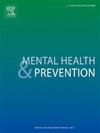Parental self-efficacy for reducing the risk of adolescent depression and anxiety during a pandemic: Scale development and validation.
IF 2.4
Q2 Medicine
引用次数: 0
Abstract
Background
The COVID-19 pandemic has negatively impacted adolescent mental health. Parents can play an important role in preventing adolescent mental health problems like depression and anxiety disorders. Pandemic situations present new challenges that are likely to impact parents’ confidence in their parenting. Given the possibility of future pandemics, parents need self-efficacy for taking action to protect the mental health of their adolescents. Improving parental self-efficacy requires suitable outcome measures. However, there is no validated measure to assess parental self-efficacy in relation to parenting behaviours implicated in the prevention of adolescent depression and anxiety disorders within a pandemic context.
Method
This study aimed to develop and validate the Parental Self-Efficacy Scale for Pandemic situations (PSES-Pandemic) using a sample of 587 Australian parents of adolescents aged 12 to 17 participating in a preventive parenting intervention trial.
Results
The PSES-Pandemic demonstrated good internal consistency and confirmatory factor analysis supported a single factor. Convergent validity was supported by moderate to large correlations with validated measures of both parental self-efficacy and parenting behaviours. Smaller, significant correlations with measures of parent distress and adolescent depressive and anxiety symptoms supported divergent validity.
Conclusions
These findings provide preliminary support for the reliability and validity of the PSES-Pandemic, which could help inform and facilitate the evaluation of preventive parenting interventions for adolescent mental health in a pandemic context, and could be adapted for future large-scale disasters (e.g., future pandemics, natural disasters).
父母自我效能在大流行期间降低青少年抑郁和焦虑风险的作用:规模发展和验证。
2019冠状病毒病大流行对青少年心理健康产生了负面影响。父母可以在预防青少年心理健康问题,如抑郁症和焦虑症方面发挥重要作用。大流行病带来了新的挑战,可能会影响父母对其养育子女的信心。考虑到未来流行病的可能性,父母需要自我效能感来采取行动保护青少年的心理健康。提高父母自我效能感需要适当的结果测量。然而,在大流行背景下,没有有效的措施来评估父母自我效能感与预防青少年抑郁和焦虑症的父母行为之间的关系。方法采用587名参加预防性父母干预试验的12 - 17岁青少年父母为样本,编制并验证大流行情境下父母自我效能感量表(PSES-Pandemic)。结果PSES-Pandemic具有良好的内部一致性,验证性因子分析支持单因素。收敛效度与父母自我效能感和父母行为的验证测量有中等到较大的相关性。父母痛苦与青少年抑郁和焦虑症状之间较小的显著相关性支持发散效度。结论本研究结果为PSES-Pandemic的可靠性和有效性提供了初步支持,可为大流行背景下青少年心理健康的预防性父母干预措施提供信息和促进评估,并可适用于未来的大规模灾害(如未来的大流行、自然灾害)。
本文章由计算机程序翻译,如有差异,请以英文原文为准。
求助全文
约1分钟内获得全文
求助全文
来源期刊

Mental Health and Prevention
Medicine-Psychiatry and Mental Health
CiteScore
2.10
自引率
0.00%
发文量
22
审稿时长
24 days
 求助内容:
求助内容: 应助结果提醒方式:
应助结果提醒方式:


